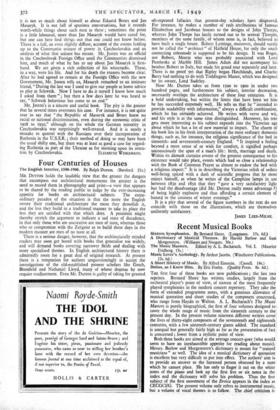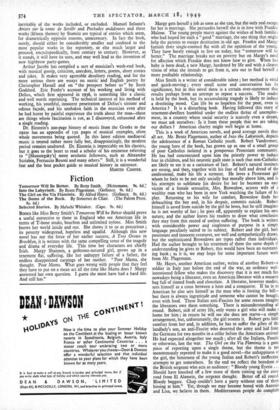Recent Musical Books
Sixteen Symphonies. By Bernard Shore. (Longmans. 17s. 6c1...) , A Dictionary of Musical Themes.. -By Harold Barlow and Sam Morgenstern. (Williams and Norgate. 30s.)
Music Lover's Anthology. By Arthur Jacobs. (Winchester Publications.
THE first four of these books are new publications ; the list two reprints. Bernard Shore'- has written studies, largely from -the orchestral player's* point of view, of sixteen of the most frequently played symphonies in the modern concert repertory. They take the form of extended programme notes, with a generous allowance -of musical quotation and short studies of the composers concerned, who range from Haydn to Walton. A. L. Bacharach's The Music Masters is purely biographical, the first of four volumes designed to r cover the whole range of music from the sixteenth century to the ; present day. In the present volume nineteen different writers cover the lives of thirty-eight composers of the seventeenth and eighteenth centuries, with a few sixteenth-century giants added. The standard is unequal but generally fairly high as far as the presentation of fact
is concerned; from a stylistic point of view.
Both these ooks are aimed at the average concert-goer (who would seem to have an inexhaustible appetite for reading about music). • Messrs. Barlow and Morgenstem's dictionary is meant for " trained musicians" as-well. The idea of a musical dictionary of quotation is excellent but very difficult to put into effect. The authors' aim is to provide an answer to the harassed person obsessed by a tune which he cannot place. He has only to finger it out on the white notes of the piano and look up the first five or six notes in the index and the dictionary will solve his problem. Thus the first subject of the first movement of the Eroica appears in the index as CECGCEG. The present volume only refers -to instrumental music, but a volume elf vocal themes is to follow. The chief criticism is
inevitably of the works included, or excluded. Manuel InfanteN Aniers sur la route de Seville and Pochades andalouses and three works (fifteen themes) by Stamitz are typical of entries which seem, for diametrically opposite reasons, unnecessary. In fact the book, surely, should either be considerably smaller and confined to the most popular works in the repertory, or else much larger and proceed, encyclopaedically, from century to century. However, as it stands, it will have its uses, and may well lead to the invention of new highbrow party-games. Arthur Jacobs has compiled a sort of musician's week-end book, with musical gossip, criticism, anecdote, letters, poems, short stories and jokes. It makes very agreeable desultory reading, and for the more serious there are essays on music and English poetry by Christopher Hassan and on " the prospect before us " by Scott Goddard. Eric Fenby's account of his working and living with Delius, which first appeared in 1936, is something like a classic and well worth reprinting. The technical interest of his method of working, his youthful, innocent penetration of Delius's sinister and odious facade, and his unshaken faith in the musician even after he had learnt by painful experience the truth about the man—these are things whose fascination is not, as I discovered, exhausted after a single reading.
Dr. Einstein's zoo-page history of music from the Greeks to the 192os has an appendix of 15o pages of musical examples, often whole movements being quoted. In this latest edition mediaeval music is treated rather more fully but, disappointingly, the modern period remains unaltered. Dr. Einstein is impeccable on his classics, but it goes to the heart to read a scholar of his eminence referring to " [Mussorgsky's] more aesthetic followers, such as Alexander Scriabin, Ferruccio Busoni and many others." Still, it is a wonderful feat and the best pocket guide to musical history in existence.
MARTIN COOPER.







































 Previous page
Previous page